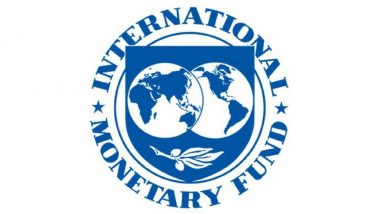Washington DC, April 6: The International Monetary Fund (IMF) is expecting a stronger economic recovery in 2021 as Covid-19 vaccine rollouts get underway and warned of "daunting challenges" given the different rates of administering shots across the globe.
The organization said on Tuesday it expects the Indian economy to grow by 12.5 per cent in 2021. Looking further ahead, the Indian economy is expected to grow by 6.9 per cent in 2022. The latest forecasts suggest that India is well placed to experience a solid economic recovery in 2021, in contrast to other emerging markets and developing economies, where it's likely to take longer to return to pre-crisis levels. IMF Chief Kristalina Georgieva Urges G20 Nations to Take Actions on Trade, Climate.
"Even with high uncertainty about the path of the pandemic, a way out of this health and economic crisis is increasingly visible," IMF chief economist Gita Gopinath said in the latest World Economic Outlook report.
"The outlook presents daunting challenges related to divergences in the speed of recovery both across and within countries and the potential for persistent economic damage from the crisis," Gopinath added.
The Washington-based global financial institution, in its annual World Economic Outlook ahead of the annual Spring meeting with the World Bank also states that China, which was the only major economy to have a positive growth rate of 2.3 per cent in 2020, is expected to grow by 8.6 per cent in 2021 and 5.6 per cent in 2022.
The IMF estimated growth of 5.1 per cent for advanced economies this year, with the United States expanding by 6.4 per cent. The positive assessment for the U.S. is highly driven by President Joe Biden's USD 1.9 trillion coronavirus rescue package, which came into force last month.
"Among advanced economies, the United States is expected to surpass its pre-Covid GDP level this year, while many others in the group will return to their pre-COVID levels only in 2022," Gopinath said.
"Within-country income inequality will likely increase because young workers and those with relatively lower skills remain more heavily affected in not only advanced but also emerging markets and developing economies," Gopinath warned, adding that lower levels of female employment was also exacerbating disparities.
As a result, the IMF said governments should continue to focus on "escaping the crisis" by providing fiscal support, including to their healthcare systems. In a second phase, "policymakers will need to limit long-term economic scarring" from the crisis and boost public investment, it added.
"Without additional efforts to give all people a fair shot, cross-country gaps in living standards could widen significantly, and decades-long trends of global poverty reduction could reverse," Gopinath said.
The Survey by the IMF staff is usually published twice a year. It presents IMF staff economists' analyses of global economic developments during the near and medium-term. Chapters give an overview as well as a more detailed analysis of the world economy; consider issues affecting industrial countries, developing countries, and economies in transition to market; and address topics of pressing current interest.
(The above story is verified and authored by ANI staff, ANI is South Asia's leading multimedia news agency with over 100 bureaus in India, South Asia and across the globe. ANI brings the latest news on Politics and Current Affairs in India & around the World, Sports, Health, Fitness, Entertainment, & News. The views appearing in the above post do not reflect the opinions of LatestLY)













 Quickly
Quickly


